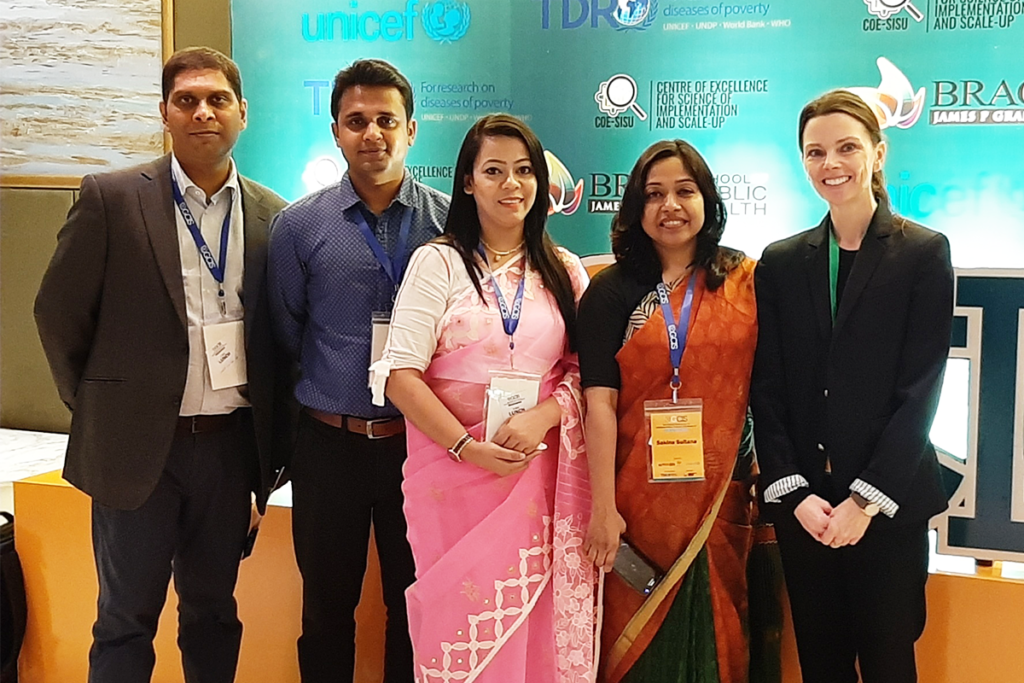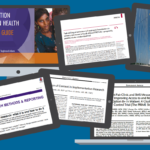I participated in the Global Conference on Implementation Science and Scale-Up (GCIS 2019), held from June 29 through July 1 at the Radisson Blu Hotel in Dhaka, Bangladesh. I was particularly enthusiastic about the conference for three primary reasons. First, I am currently working on an implementation research project; second, the conference is the first-of-its-kind in a low- and middle-income country setting; and third, I was excited for a get together with my former colleagues from BRAC James P Grant School of Public Health (as I worked there immediately before joining FHI 360), who, along with UNICEF Bangladesh, organized the event co-hosted by WHO-TDR.
In this post, I describe FHI 360’s organized session at GCIS 2019, highlight take-home messages from different presenters and outline thoughts on the future direction of implementation science.
FHI 360 at the conference
On the second day of the conference, FHI 360 organized a parallel session titled, “Employing Implementation Research to Improve Bangladesh’s Response to Malnutrition: USAID’s Strengthening Multisectoral Nutrition Programming through Implementation Science Activity (MSNP)”. The session was chaired by Md. Shah Nawaz, Director General of Bangladesh National Nutrition Council (BNNC), and co-chaired by Jennifer Crum, Chief of Party of the MSNP, FHI 360 Bangladesh.
The next speaker, Fatema Rojy, a representative of one of our implementation partners, Partners in Health and Development, discussed the challenges of adjusting and aligning their field work with the needs of an implementation research project. For example, permeating the message that this is a research project, Rojy highlighted how the selection of intervention and control areas – among staff as well as beneficiaries – seems to be a big challenge.
Next, the project’s research utilization adviser, Enam Hasib, described the painstaking efforts of MSNP to engage stakeholders from the initial stages of the project’s research utilization activity design. This step is crucial to ensure government leadership, thus working to build on the existing system for evidence utilization. He described the stakeholder mapping, evidence utilization assessments both at the national and subnational levels, and the future plans to improve the evidence utilization by key stakeholders.
The next two presenters, Hasan Mahmud from BNNC (a government representative) and Sakina Sultana from CARE Bangladesh (an NGO representative), talked about the lessons learned from early project activities and challenges of evidence utilization, concluding with opportunities for the MSNP to strengthen evidence utilization at the national and subnational levels, respectively. Theresa Hoke, the Director of Health Services Research at FHI 360, served as the wrap-up co-chair for the session.
An innovative audience participation session called a “Samoan Circle” followed these panel presentations. A Samoan Circle has people seated in a circle within a circle; however, only those in the inner circle can speak. The inner circle consists of four seats, one each for the moderator, panel presenter and two members from the audience. The moderator facilitates questioning of the panel presenter by the audience members coming to the inner circle. Other audience members sitting or standing in the outer circle must remain silent. The moderator changes the panel presenters with time and when questions for her/him are addressed. Members from the outer circle voluntarily replace members of the inner circle one at a time and take part in questioning the panel presenters and expressing their views.
Highlights from the conference
Apart from our FHI 360 session, GCIS 2019 also had five plenary sessions, 13 parallel sessions, one satellite session with USAID, and poster presentations. Below I briefly highlight some of the important messages derived from these other sessions.
- According to Mushtaque Raza Chowdhury, the Vice-Chairperson and Advisor of the celebrated Bangladeshi NGO BRAC, when diarrhea was a major killer in Bangladesh in the 1970s and 1980s, BRAC’s implementation research approach with oral rehydration therapy became so successful that it eventually became a part of the culture.
- According to Asif Saleh, Executive Director of BRAC, piloting is not an end in itself, and there must be a clear plan to scale up development projects.
- Donna Spiegelman, Professor at the Yale School of Public Health, emphasized the importance of robustness of methods used in implementation research.
- Laura Damschroder, Research Investigator at the U.S. Department of Veterans Affairs, reminded the audience of the political nature of implementation research.
- Ayman El-Mohandes, Dean of CUNY Graduate School of Public Health and Health Policy, argued that policymakers too should be educated in evidence-based policymaking and using the evidence generated from implementation research.
- Malay Mridha, Associate Professor at BRAC James P Grant School of Public Health, shared a story about scurvy among sailors to highlight the importance of translating research findings for policymakers. He asked, “It does not take long for Pepsi or Apple products to get sold. Why then did it take 42 years for Vitamin C to get taken up by policymakers and introduced to sailors to prevent scurvy.”
- Bachera Aktar, Senior Coordinator at the BRAC James P Grant School of Public Health, outlined the importance of context in implementation research by giving an example of the BRAC Manoshi Project – a maternal, newborn and child health program – which had to take different shapes in its urban vs. rural versions.
- Joseph Kimani, Support Professional of SDI Kenya, discussed a different form of present-day exploitation, “Like mining of oil, communities are being used as the sources of data.”
- Vijayaprasad Gopichandran, Assistant Professor of Community Medicine at ESIC Medical College and PGIMSR, while discussing the ethical issues in implementation research, argued how the concept of “contextual equipoise” can be applied in implementation research as opposed to “clinical equipoise”.
- Sally Theobald, Professor at Liverpool School of Tropical Medicine, and Till Bärnighausen, Director of the Heidelberg Institute of Global Health, argued that implementation research takes place in a health system, which by default is a complex adaptive system, hence, amenable to change.
- Several speakers, e.g., Kaosar Afsana, Professor at BRAC James P Grant School of Public Health, Olakunle Alonge, Assistant Professor at Johns Hopkins Bloomberg School of Public Health, Sally Theobald, Professor at Liverpool School of Tropical Medicine; and Malabika Sarker, Associate Dean and Professor at BRAC James P Grant School of Public Health, emphasized the balance between the “hardware” and “software” aspects of implementation research. They argued that researchers are often poorly trained to communicate with policymakers. Therefore, capacity building on soft skills is needed for the researchers.
Thoughts on the future direction of implementation research
I agree with the panelists on the importance of all of these topics. However, a few additional topics may be worth considering, such as: rigorous methods in implementation research and capacity building of researchers using them; public-private partnerships in implementation research; and finding common ground and common vocabulary that is understandable by researchers, managers and policymakers alike.
The concepts of implementation science have already started to mature, but there is still much to be done. Multiple definitions of implementation research often confuse stakeholders. There is no agreed guideline on which implementation research frameworks can answer research questions. Additionally, there are debates on whether an approach can be called implementation research even when that approach is being displayed by others to be their flagship. Despite these debates and some disagreements, the discipline of implementation science is increasingly viewed by policymakers, managers and researchers as an important means for addressing the most important real-life research questions in global health.
Photo caption: FHI 360 partner presenters at GCIS 2019
Photo credit: FHI 360



